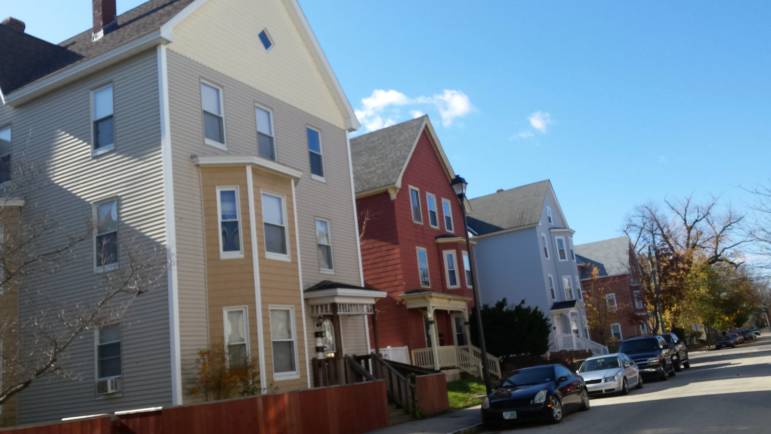
MANCHESTER, NH — Rising rents, low vacancy rates, and a tight real estate market have led to a housing crisis in the state of New Hampshire. According to Dean Christon, NH Housing Finance Authority Executive Director, “The lack of available housing is an existential threat to our communities and our economy.”
Christon was speaking at the New Hampshire Business and Industry Association’s annual forum on workforce housing at the Doubletree Hotel in Manchester on November 6.
The BIA began looking at housing more than a decade ago when a series of business roundtables identified the lack of housing as a deterrent to hiring workers and growing New Hampshire businesses.
Diversity is Key
The forum featured a panel discussion with Kevin Dailey, VP of Administration/Chief Human Resources Officer, Southern Vermont Medical Center, Ryan Hvizda, Realtor, Keller Williams Realty Metropolitan, Joe Mendola, NAI Norwood Group, Ari Pollack, Director, Gallagher, Callahan & Gartrell, and Matt Sullivan, Planning Director, Town of Wolfeboro, NH
Realtor Ryan Hvizda began the discussion by saying that people are looking for a variety of housing types. She notes, for example, that we look at millennials as a monolithic culture that wants only small, urban apartments, however, that is not what she sees among her millennial clients. “One person may be looking for a house in the middle of 5 acres where they never see their neighbors, another is looking for a multi-family to start building a portfolio of properties.”
Matt Sullivan, planning director of the town of Wolfeboro, echoed the importance of having diverse housing options. “Wolfeboro is an attractive community for high-income retirees who will need access to healthcare, grocery stores and other services. They will need younger people to help them age in place. Providing a diverse mix of housing for residents of all ages is key,” he said.
Creative zoning
Zoning laws in communities can be a barrier to diversified housing development. Ari Pollack, who is involved with the Woodmont Commons development in Londonderry, a large mixed-use development in the middle of a 600-acre former apple orchard, said that they were able to sidestep the zoning restrictions by using the master planning process. The development is a separate carve-out with 13 zones with varying levels of allowable density. The first completed buildings in the development include the 603 Brewery and a mixed-use building with a combination of retail and 87 high-end apartments. Future plans include development of single-family homes on the periphery, a 62-plus development consisting of 62 housing units and a 280-bed nursing home, and affordable housing options for employees of local businesses.
Hvizda is currently working on a development of single and multifamily units in the middle of an organic farm in Amherst, that they are calling an agrihood. Amherst has provisions for innovative housing developments in their zoning laws. However, neighbors are resisting the project. She said, “We need to educate communities that we need housing that is affordable for everybody, including teachers, and the people who work at the post office and the grocery store. Diverse housing is a good thing.”
Joe Mendola has been working with his state representative from his hometown of Warner to craft legislation to pave the way for a tiny home revolution in the state. He believes that tiny homes are particularly suited to millennials because at $45-80,000 they are affordable for someone carrying student loan debt, and they are on wheels so they can follow their owners through careers that may see as many as 20 job changes. A bill will be making its way through the legislature this year that would make New Hampshire the only state east of the Rockies that has laws in place to support tiny homes.

Employers taking the lead
When Southwestern Vermont Health Care in Bennington, Vermont, saw how difficult it was for their employees to find affordable housing close to their workplace they decided to take matters into their own hands. A few years ago they set up a non-profit organization to buy abandoned homes, renovate them, and sell them back to their employees.
According to hospital administrator Kevin Dailey, they have completed five houses and have two more in the works. The hospital covers the closing costs, so the owner only needs to worry about the mortgage payment and insurance.
They typically loss about $25,000 on each project but it is worth it, Dailey says.
“As a non-profit, we have an obligation to invest in the community. This not only helps us with employee retention and morale, it also has a great impact on the community,” Daily said.
Manchester
How can these ideas be applied to Manchester’s need for affordable housing? According to Christon, Manchester’s zoning laws are more inclusionary that some other communities and that is a good thing. Nevertheless, developers are inclined toward high-end developments because it is easier to recover their costs. He adds that while you can’t tell a developer what to build, you can encourage them.
“You can say to them, ‘you would be able to put 14 units on this size lot, but we’ll let you build more if you agreed to make some of them affordable’, Christon said.
Interested in learning more about affordable housing in Manchester? Progressive Manchester will be holding a public forum on the issue at the Manchester City Library at 6 p.m. on November 12.







